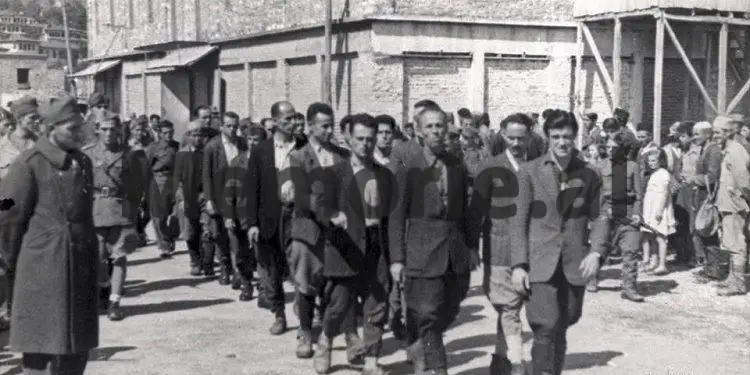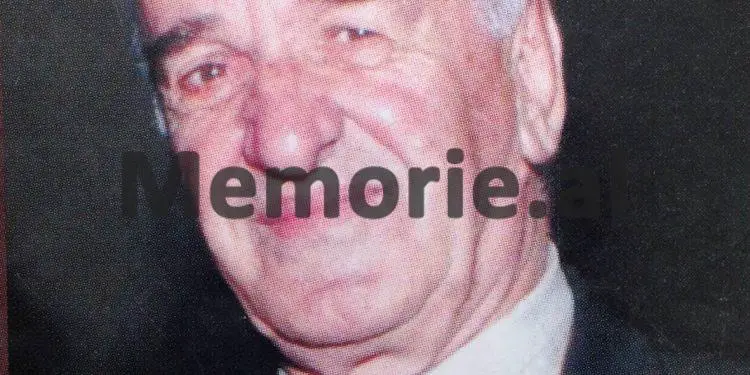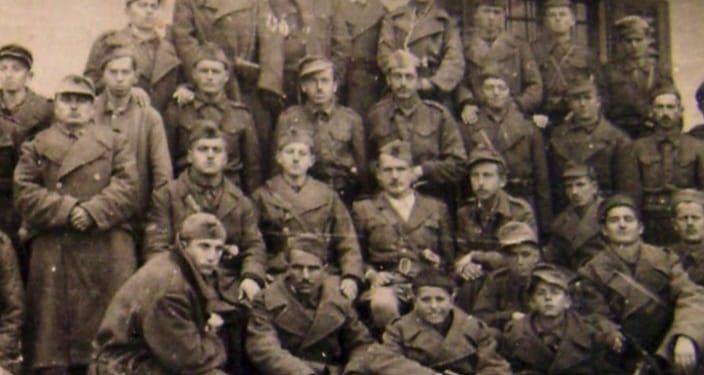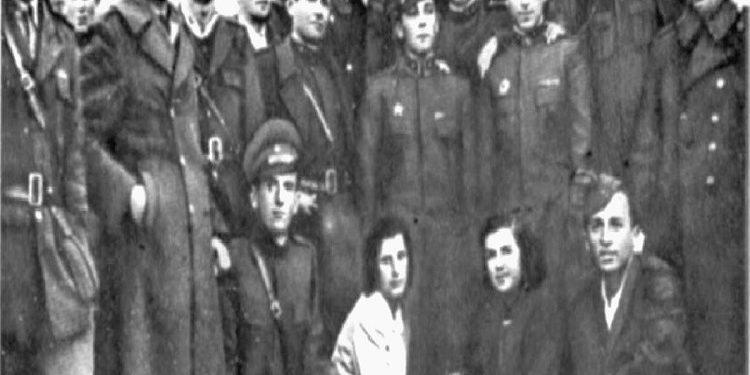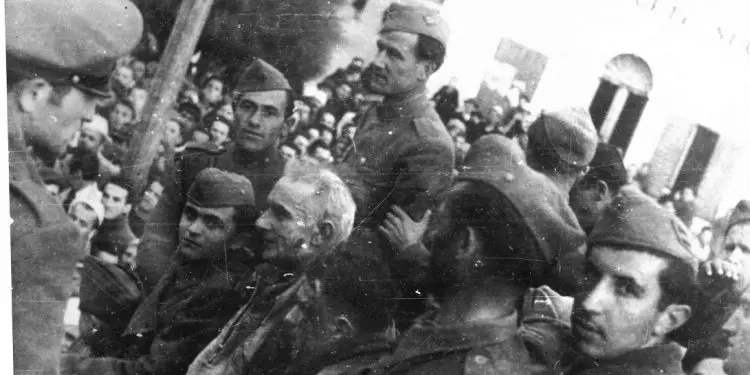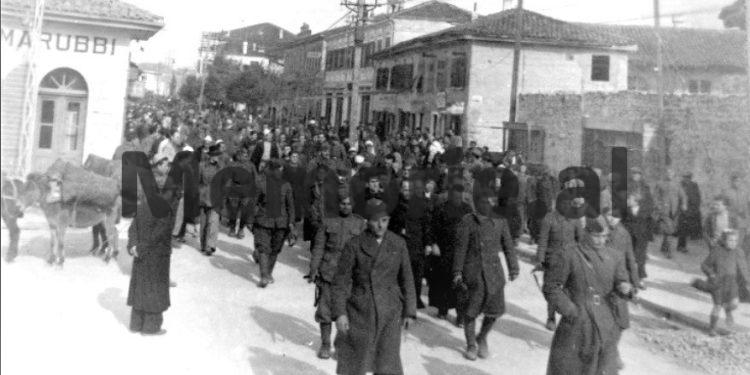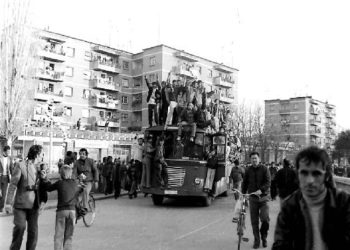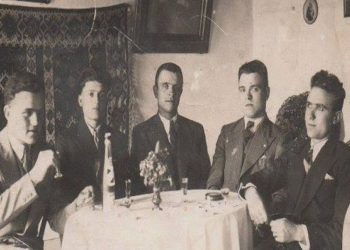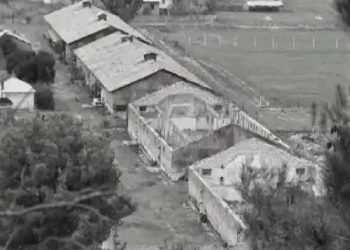By Ahmet Bushati
Part seven
Memorie.al/After the flag was altered in 1944 with the addition of the communist star, Shkodra transformed into a center of resistance against the regime, paying a high price for its tradition of freedom. By April 1945, high school students, already feeling betrayed by the promises of the war, gathered to oppose the new terror that imprisoned and killed innocent people. Communism turned Kosovo into a province of Yugoslavia, while Shkodra was punished for its “historical crime”- its defiance against invaders. The “Postriba Movement” became a tool to suppress all dissent, plunging the city into an unprecedented spiral of suffering: imprisonments, executions, and the destruction of families. The high school students, alongside citizens, became symbols of resistance, while some “young communists” turned into tools of the State Security, leading to expulsions, imprisonments, and internments.
Four times, Shkodra rose in armed rebellion, but history forgot these battles. This book is written to remember the countless prisoners, the tortured, the killed, and the parents who suffered in silence. It is a warning against dictatorship and a plea for future generations not to forget the sacrifices made for freedom.
Continued from the previous issue
In the Footsteps of a Diary
Shkodra in the first years under communism
The organs of the new government, a natural communist deception
Towards the end of that December, the organization of the “Organs of Government” and various “associations” took place, at the head of which, for demagogy, were placed well-known intellectuals and respected citizens of Shkodra, including clergymen, while for most of them that government, from that time on, would begin to open their graves.
The communists, who had so quickly degenerated into swindlers and traitors, would not rush into their criminal affairs. They, calmly and behind the scenes, would prepare traps after traps for their opponents, marked, as the case may be, for “prison” or “death”. Thus, at the head of the “District Council”, they would appoint Riza Dani, whom, for the sake of opportunity, after a year, they would also run for deputy, but without ever giving up on killing him at the right time. As a “postage stamp” after Riza Dani, they would appoint Zija Dibra, who, with the supposedly formal duty of secretary of the District Council, would cover that of the “Secretary of the Party”, still undeclared. His Party would also “think” about Zija Dibra, when it reserved for her a life of ours, with prisons and exiles.
As for more irony, in the composition of the various committees, they would also appoint clergymen. Dom Ndre Zadeja and Pater Gjon Shllaku, were elected members of the “Literature Commission”, while Dom Mikel Koliqi, in that of music. Dom Ndre Zadeja was known and respected, both as a cleric and as a poet.
His melodramas, so inspired and patriotic that they were, had earned him the name and nickname “the poet of ambition”. He was also appreciated as a talented publicist and translator, and there were many who had not forgotten how indignantly he had opposed the Italian priest Cordignano, when the latter had denigrated our people before the world.
So, regardless of everything, the black hole would be a quick end for him. Where after a year, the same fate would fall on that Gjon Shllaku, who in the “frets’ gymnasium” continued to give lectures on philosophy and French, and who was known by everyone as a moderate friar and, as he was related to many intellectuals of the city. Regardless of his declaration as an anti-fascist during the War, or the pain that his murder would cause in the people, nothing would stop the bloody hand of the communists against him. And yet, it was the beginning.
Chairman of the “Democratic Front” – a label after which the “Communist Party” was looked upon – was appointed Beqir Gjylbegu, from the honorable house of Gjylbegu. Even more formally, as a member of that leadership, the sympathetic citizen, Tefë Pogu, had been appointed, to whom, within a few days, the “Popular Power” would seize his factory, house, and everything he had, and one day, he and his brother, would be thrown in prison. Between Beqir Gjylbeg and Tefë Pogu that power had thought of placing the trusted Arif Gjyli and Mark Ndoja although even for these, their party, without any fault or consideration for anything, not evens their valuable contribution during the War and afterwards, would think of putting them in prison one day after the other.
Chairman of the “Economic Commission”, appointed by Prof. Kolë Prela, who during the War, although a nationalist, had been included within the ranks of the “National Liberation Party”. After a year, they would also elect him as a deputy, to be labeled an “enemy”, and he was shot after another year.
Are you sorry, but are you not surprised by Noli’s political naivety?!
I would call those Albanians happy who, in one of those first days of December 1944, did not have the misfortune, to have in their hands, for even more indignation, a declaration that Noli, with the intention of coming to the aid of the communists at the right time, had sent from distant America, and precisely, one day after they had liberated Tirana, a very hasty declaration, even though it had been clear to many Albanians for more than a year that the “national liberation movement” in Albania had taken on an ideological character. Also, Noli, if he didn’t want to remember what many years ago his close friend, Llazar Fundo, had written to him from Red Russia, when, among other things, he had said to him: “I doubted that communism was Christ, but it is worse than the devil”!
Thus, Noli, not wanting to take anything into account, would send his famous declaration, from which it is enough to extract only its last lines: “….. that from the darkness of the dead ends we are entering the light and the open field of action, with leaders who have proven their ability in the line of fire. These leaders must be supported unconditionally, without reservations and without sparing, because they deserve the people’s trust completely. With these leaders, the fate of the homeland is sealed.
Long live Albania
Fan Noli
November 18, 1944
The murder of Halil Ali, the legendary brave from Dibra
On the last day of December 1944, the newspaper “News Bulletin”, which came every day from Tirana, talking about the murder of Halil Ali, among other things, would write: “With a rare heroism on the part of the partisans, they were even able to set fire to the house. Due to the snow and the storm, the roof where the partisans had climbed did not catch fire. Then forces from the 17th and 18th brigades arrived, forming a triple siege. At 8:30 p.m., forced by smoke and flames, Halil Alija and other criminals attempted to break the siege, but fell under the barrage of machine guns!
An episode like this, filled with the glory of a rare act of bravery, needs no comment: two brigades helping the forces of another brigade, to surround a single house, with a handful of people inside, even though they had turned into lions, is enough to show the bravery of Halil Alija and his friends.
Years later, I would have the opportunity to hear what Petrit Dumja, a participant in that siege, had told a friend of his: “I spent hours standing with a machine gun, behind the courtyard of the house, inside which Halil Alija continued to fight. During that entire time, the muzzle of my machine gun would only look out from the gate above the stairs, from where Halil Alia would be expected to emerge from any moment. At the moment when the whole house was engulfed in flames, Halil Alia came out with two cobras in his hands, shouting: ‘Halil Alia will not surrender to the communists alive’!
We gave some space in our chronicles to the brave Halil Alia, only because of his stay, a friend in our city during the last two months, before he was killed, as well as for his last act.
The uprising of Bërdica accidentally fails!
In a climate of terror never seen before, the villages of Sub-Shkodra such as; Bërdica, Trushi, Melgushi, Kosmaçi, Mali Kolaj, Velipoja, Ana e Malit and the area of Guri i Zi, dissatisfied with the government’s restrictive measures that were being imposed on them, got ready for an uprising. At this time, Jup Kazazi and Abaz Ermenji, for several days now, had been sheltering in The village of Trush, precisely in the house of the Xhurretajs, where a meeting was held, in which, in addition to Shaqir Xhurreta and his brother, Dedë Shabani from Mali Kolaj, as well as Sait Cani, Veli Xhepi, Nikollë Zefi and Sadik Mema from Trush, had also participated.
Another meeting was also held in Trush, in the house of Dedë Gjodash, where together with Dedë Shabani, Xhemal Mlika of the beyler of Lezha had also been present. They were thinking of an uprising. Attempts were made to connect with the fugitives of Above Shkodra led by Llesh Marash and Preng Cali, as well as with the Gjomarkaj of Mirdita, with the aim that after the capture of Shkodra, a free zone could be created up to Shëngjin, as a condition and opportunity for the landing of the allied forces. For this, according to the news of the previous day, in On the evening of January 14, 1945, a large number of armed men from the villages of Trush, Bërdicë, Melgushë, Mali Kolaj and Ana e Malit gathered at the church of Beltojë, ready to take Shkodra.
Led by Halit Kazazi and Dede Shabani, the forces set off from Beltoja towards Bërdicë. On the way, Dede Shabani breaks away and goes to Kosmaç to inform Jup Kazazi and Abas Ermenji, who were at Halit Gerbet’s house, of the above. Jupi, for his part, sends a man to Vukatanë, to his trusted friend, Arif Selimi, with the order to mobilize the men of the village of Vukatanë and the entire area of Guri i Zi, of which he was the chairman of the council. On the evening of January 14, the above forces, as a precautionary measure, cut the telephone lines connecting Shkodra with Lezha and Tirana, and blocked the road by cutting down trees along it.
Halit Kazazi and Dede Shabani would continue their journey towards Baçallek and Shkodra, while Hasan Isufi and a few others would wait in Beltoja for the one coming from Tirana. After a short while, a military vehicle coming from Tirana, loaded with military clothing, would stop at the Beltoja turnoff, due to a defect in its engine. There were two partisans and a partisan in the vehicle. Meanwhile, Jup Kazazi and Halit Gerbeti, who had just separated from Abas Ermenji and were hurrying to catch Shaban Dan’s boat from Bërdica a minute earlier on the banks of the Drin, with which they would go to Vukatanë. The moment Jup Kazazi and Halit Gerbeti set foot on the boat, they were heard from not far away, a barrage of machine guns:
Hasan Isufi there in Beltoja, wanting to keep the secret of the uprising about to explode, would kill on the spot the two partisans who were in the car. Jupi had not yet managed to cross the Drin when his brother, Halit, suddenly appeared on the shore, who would tell him about the incident that had occurred. Jupi, for his part, would immediately decide to suspend the attack on Shkodra and disperse his forces. On the other side of the Drin, in Vukatanë, Jup Kazazi found many men waiting for him armed and, after telling them what had happened, dispersed them, ordering them to be ready at a later time.
Thus, the Berdica Uprising, the first in the series of Shkodra uprisings against the communist regime, failed before it even began. Jup Kazazi and Halit Gerbet continued their journey to Gur i Zi and spent the night at Arif Haxhi’s house, to separate the next day, when Jup would head for Postrriba, where his other two brothers, Zeneli and Hamiti, who until a few days ago had been sheltering inside a house in Sumë, and who, later, pursued by the People’s Defense forces, were forced to find shelter inside a cave, above the village above. Meanwhile, Abas Ermenji, from Kosmaç, had set off for the South.
Later, when Abas Ermenji was in exile, in connection with the above events, he would write in his book entitled “Albania”: “The author of this study stayed in the Shkodra region together with the Kazazi brothers, hoping for the possibility of a new organization of the forces of Northern Albania. The people of the Shkodra regions received them everywhere with their usual hospitality and manliness, but they were completely unprepared for an organized movement. In January 1945, the Kazazi brothers and I raised a force and tried to liberate Shkodra, with the aim of mobilizing the youth, but the matter failed, because with only the peasants, nothing could be done to them”!
The dispersal of the insurgent forces would give way to a People’s Defense operation, the consequences of which would be tragic for many families in the villages of Sub-Shkodra. The notorious partisan battalions, commanded by Shefqet Peçi, would be unleashed like rabid wolves on the defenseless population, in which case men from the villages of Trush, Mali Kolaj, Vukatanë and Gur i Zi would be shot without trial, several houses would be burned and much property would be looted. Village by village the people would gather and, in the presence of their own families, many men would be handcuffed. It would happen that at such gatherings of people, for terror, a man would be killed in front of everyone, in whose possession any rifle might have been found during the search.
Hasan Isufi, together with his brother, Ahmeti (Shurdhen) and his nephew, Adem, would be surrounded in the place called “Neck of the Paths”, Mali-Kolaj, where after a long resistance, both the brave Hasani and Ahmeti would be killed, while Adem would be captured and wounded, to be shot a few days later. With them would have been a certain Hajro Mejhlijet, from the Ulcinj area, who on that occasion had managed to break through the siege and jump across the Albanian border, to the Yugoslav side.
Those accused of the Bërdica incident would be shot without trial and in the presence of the people, from the village of Bërdica, Taip and Rexhep Halili, father and son, as well as Veli Sala, Lush Paloka, Shaban Dani, Hider Dyli, Martin Rroku, Pjetër Derragjati, Pjetër Harapi and Pjetër Lorja. The following would be sentenced to many years in prison: Nuh Dyli, Loro Simoni, Tomë Paloka, Mark Derragjati and others.
Xhemal Mliken from Lezha would be shot and pinned to a wall of the former Beer Factory, opposite the old football field, where, out of terror, they would leave him there all day, for the people to watch. Along with the above-mentioned people, another Bërdica resident, Haxhi Ahmeti, had also been arrested, who on the way would jump out of their cars and escape, having enjoyed a city of Shkodra. His house was set on fire and his wife and two young children were exiled to Berat.
For the Bërdica incident, Arif Selimi of Vukatana, a loyalist of the Kazazes, who knew the place where the masked men were hiding, but did not take them out, is having said: “I owe that house a debt and I cannot refuse it, because I have been living off their bread since my grandmother”!
With the Bërdica event, it remains to be noted the presence with arms in hand of a woman, a brave girl from Lushnja, named Neta Fuga, who had initially participated as a partisan with responsibility in the First Brigade, and who had then left the “National Liberation Movement”, when the latter began the fratricide, a time when Neta Fuga would eventually return to being a fighter with arms in hand, within the nationalist ranks of the National Front. After the failure of the Bërdica uprising, she would be captured by partisan forces, while trying to cross the Drini in a boat.
Llesh Marashi and the uprising with his name!
Three weeks had passed since the partisan brigades had attacked Kelmendi and it would take them another three weeks to conquer it, when the uprising that would come to be known as the “Llesh Marashi Uprising” would begin in Shkrel.
The “Marashi” house from Zagoret had been known since early in Highland for its rifle tradition, and its own son Lleshi, during the “Intervention” – the time after the First World War – had studied gendarmerie weapons in Austria. Llesh Marashi and his brother, as gendarmerie officers, had had the opportunity to prove their unwavering loyalty to the state and its leader, King Zog I. Thus, in 1935, Lleshi, together with his brother, Gjeka, would ambush the rebels of the “Fier Uprising” in Lushnje and crush them.
After the occupation of Albania, Llesh Marashi would be among the first, if not the first, in the entire Shkodra area to go out into the mountains with weapons in hand to fight the invaders, as the patriot and legalist that he was.
After the capitulation of Italy, as we know, in Albania the Germans were introduced to their path of gradual retreat to Germany. At this time in Tirana, a government headed by Rexhep Mitrovica was formed; a government that, like most nationalists at that time, would not consider the temporary and transitory stay of the Germans in Albania an occupation. Thus, Llesh Marashi – like all the other legalists who had fled by then – came down from the mountain and was entrusted by that government with the duty of district commander for Shkodra, having as his colleague Shaban Elezin, in the duty of district commander.
The coming to power of the communists would bring Llesh Marashi back to the mountain. Two months of murders, imprisonments and reprisals by partisans all over Highland were enough to turn that Kreshnik area into a powder keg, ready to explode at the first opportunity. In addition to Llesh Marashi, other groups of fugitives were also circulating in Malci at that time. Even the verses sung by a girl named Tone Kuqia on the occasion of a death, perhaps shed some light on the situation in question:
Woe to you, Highland
The house is burned to ashes
There is no more leaf or grass
The best men are tied to ropes.
Our hotties are tied with wire,
The worst in Kastrat and the worst in Shkrel,
And in Kelmend neither a hen nor a rooster crows.
But it won’t go away, for a long time
Let the boys come out to the Lord
The Llesh Marashi uprising had not been predicted for the day it happened. It was sparked completely by chance and for an insignificant reason. Highlander Luket Marashi, from the Grishaj neighborhood of Shkreli, was known by everyone to be the main shelter of Llesh Marashi, so on January 23, 1945, a day during which it was snowing, the People’s Defense forces were looking to arrest Luket Marashi, at the time he happened to be above the village together with Llesh and his platoon. The partisans, worried that they were not catching Luket, raided his house, taking everything they found inside, such as livestock, food, etc. and in the end they even set it on fire. Meanwhile, the group of fugitives who had been on the mountain until then had been following those scenes with great anger, and could no longer restrain themselves, – they were persistently asking Lleshi to allow them to open fire. It is said that Lleshi, who hoped for an uprising of all the mountaineers, tried to curb the impatience of his fighters, repeating to them several times, “that an uprising on that day would be premature and with unnecessary consequences”. It is also said that in the future, those fighters were no longer holding back, as much as Lleshi himself with his silence, as if he was finally approving the attack.
After the squad was unleashed with fury on the partisans, the village was also suddenly on the move with weapons in hand. The bells rang in Shkrel, and soon they were heard to ring in Kastrat as well. It wasn’t long before echoes of the bells were coming from Reçi. The enthusiasm of the mountaineers who were running with weapons in their hands was at its peak, but unfortunately, that uprising would lack organization, as suddenly as it had erupted and since the agreement had not yet been made with the fugitives and other mountaineers. However, the attack of the mountaineers was so lightning fast that the forces of the People’s Defense retreated almost without resistance and in great panic, when each of them would only think about how to save his own head. A part of them hid where they could and another part surrendered. But in any case, the war would continue place after place and would have its casualties. Thus, in the midst of the war, the commander of Bajza, Jonus Naci, father of the commissar of The Great Highlands, Çun Jonuzi, was killed. Along with him, the officer of that post, Myftar Sokoli, was also killed. In the aftermath, the posts of Shkreli, Bajza and Gruemira were surrendered one after the other, as well as Koplik itself.
The unstoppable attack of the mountaineers, although partially armed, could not be stopped, for which they would be paid for that day with the blood of some of their brave men. Thus, at Shkreli’s church, Marash Tomë Gjeloshi would be killed. Shkreli’s men, after quickly taking the Dedaj post, would attack that of Bajza, for the capture of which Pjetër Gjoka would fall. Zef Toma, the young officer who had been placed in charge of the Grishaj, would also be killed, along with another highland, Lulash Cuku. At the end of that day, Luigj Kolë Shetaj and Mirash Gjoni would also be killed fighting. Meanwhile, the scene of the uprising had other events:
There was a time when, among other things, a partisan brigade of Luma operated in highland, with commander Njazi Hoxha, who, on the occasion of this uprising, had taken refuge in the house of Zek Zeneli, from the Mehaj neighborhood of lower Koplik, who, according to custom, had received his friend, telling him that if he wanted, he could turn the house into a fortress. Njazi Hoxha, – as the owners of this house would tell us – had calmed down when he heard that at the head of the insurgents was Llesh Marashi, with whom he had known each other since several years ago, when they had served together as soldiers in Burrel, Llesh having been his superior. Llesh Marashi treated the surrendered Njazi Hoxha as a friend he had and all his staff captured on that occasion, released him without touching him and with all his weapons. Lleshi also freed the partisans who were in Koplik, for whose sake Shaban Binaku’s house deserves to be singled out. Memorie.al




